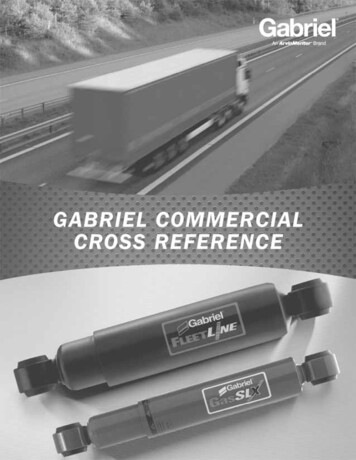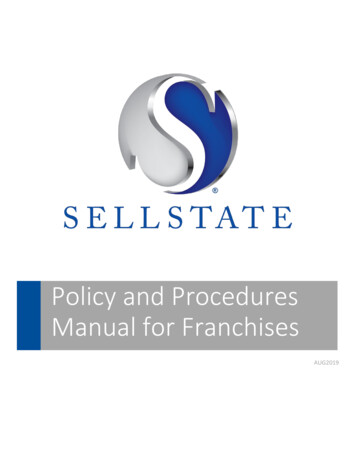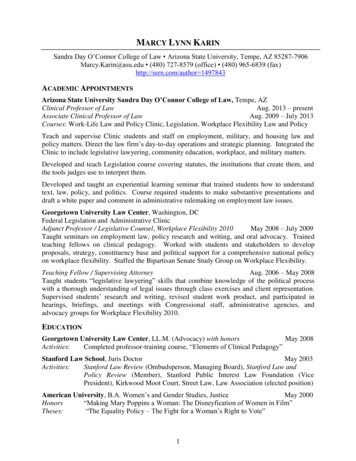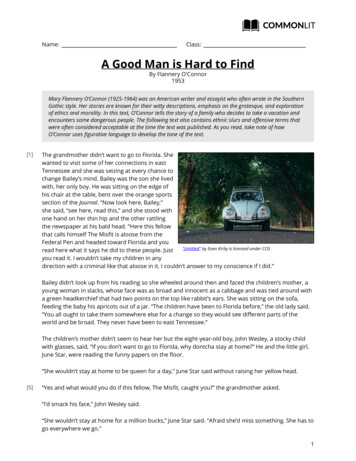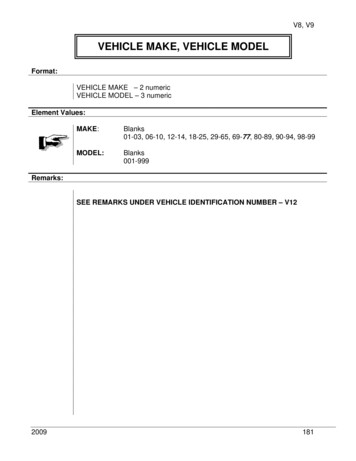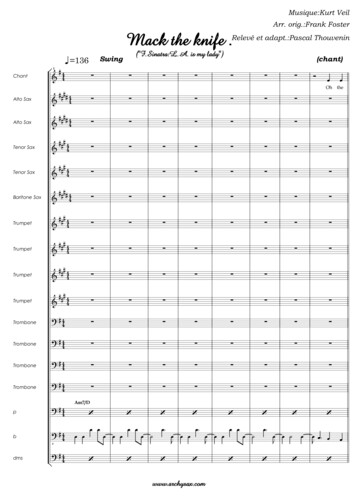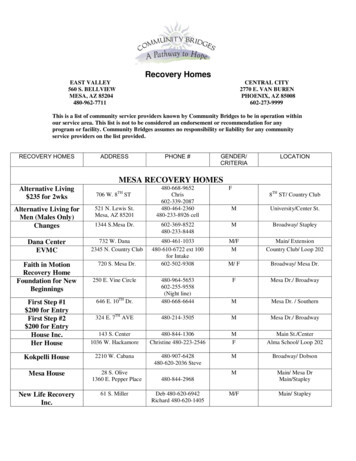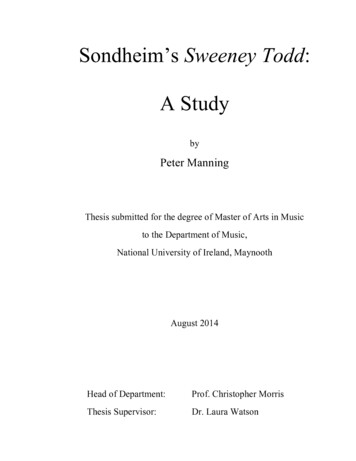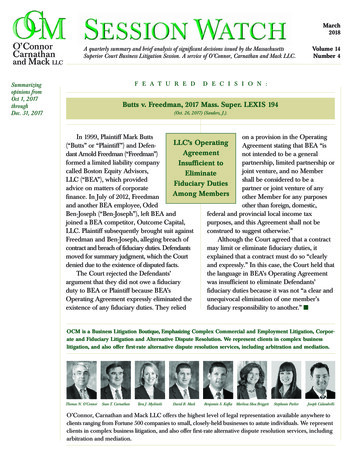
Transcription
March2018O’ConnorCarnathanand Mack LLCA quarterly summary and brief analysis of significant decisions issued by the MassachusettsSuperior Court Business Litigation Session. A service of O’Connor, Carnathan and Mack LLC.F E A T U R E DSummarizingopinions fromOct 1, 2017throughDec. 31, 2017Volume 14Number 4D E C I S I O N :Butts v. Freedman, 2017 Mass. Super. LEXIS 194(Oct. 26, 2017) (Sanders, J.).In 1999, Plaintiff Mark Buttson a provision in the OperatingLLC’sOperating(“Butts” or “Plaintiff”) and DefenAgreement stating that BEA “isAgreementdant Arnold Freedman (“Freedman”)not intended to be a generalformed a limited liability companypartnership, limited partnership orInsufficient tocalled Boston Equity Advisors,joint venture, and no MemberEliminateLLC (“BEA”), which providedshall be considered to be aFiduciary Dutiesadvice on matters of corporatepartner or joint venture of anyAmong Membersfinance. In July of 2012, Freedmanother Member for any purposesand another BEA employee, Odedother than foreign, domestic,Ben-Joseph (“Ben-Joseph”), left BEA andfederal and provincial local income taxjoined a BEA competitor, Outcome Capital,purposes, and this Agreement shall not beLLC. Plaintiff subsequently brought suit againstconstrued to suggest otherwise.”Freedman and Ben-Joseph, alleging breach ofAlthough the Court agreed that a contractcontract and breach of fiduciary duties. Defendantsmay limit or eliminate fiduciary duties, itmoved for summary judgment, which the Courtexplained that a contract must do so “clearlydenied due to the existence of disputed facts.and expressly.” In this case, the Court held thatThe Court rejected the Defendants’the language in BEA’s Operating Agreementargument that they did not owe a fiduciarywas insufficient to eliminate Defendants’duty to BEA or Plaintiff because BEA’sfiduciary duties because it was not “a clear andOperating Agreement expressly eliminated theunequivocal elimination of one member’sexistence of any fiduciary duties. They reliedfiduciary responsibility to another.”OCM is a Business Litigation Boutique, Emphasizing Complex Commercial and Employment Litigation, Corporate and Fiduciary Litigation and Alternative Dispute Resolution. We represent clients in complex businesslitigation, and also offer first-rate alternative dispute resolution services, including arbitration and mediation.Thomas N. O’ConnorSean T. CarnathanTara J. MyslinskiDavid B. MackBenjamin S. KafkaMarlissa Shea BriggettStephanie ParkerJoseph CalandrelliO’Connor, Carnathan and Mack LLC offers the highest level of legal representation available anywhere toclients ranging from Fortune 500 companies to small, closely-held businesses to astute individuals. We representclients in complex business litigation, and also offer first-rate alternative dispute resolution services, includingarbitration and mediation.
O T H E RD E C I S I O N S :Beninati v. Borghi, 2017 Mass. Super. LEXIS 206(Oct. 5, 2017) (Sanders, J.).that are assessed in connection with aIn a prior decision in this case,Attorneys’ FeesChapter 93A finding does not turn onthe court determined that defendantIncurred Duringthe defendant’s culpability. Rather,Harold Dixon (“Dixon”) violatedthe focus of the inquiry is on theChapter 93A. The court also deterPre-Litigationreasonableness of the fee request.”mined that defendant Steven BorghiSettlementTherefore, the court found that(“Borghi”), a shareholder of plaintiffDiscussionsreducing the fee award would haveWOW New England (“WOW”),theeffect of penalizing WOW andshould not be able to benefit fromExcluded fromthat any benefit realized by Borghithe Chapter 93A damages awardChapter 93A Feewould not be the same as the “windfall”and therefore reduced the damagesAwardhe would have received had theto WOW accordingly. Dixondamages award not been reduced.requested that the court similarlyThe court did, however, exclude the 170,000 inreduce the attorneys’ fees awarded to WOW underpre-litigation fees, which related to extensive settleChapter 93A. Dixon also requested that the courtment discussions between the parties. The courtexclude from the attorneys’ fees award approxistated that it was “aware of no authority that permitsmately 170,000 incurred before the litigation began.the award of fees incurred before the litigation beganThe court declined to reduce the award ofand that do not bear directly on its preparation.”attorneys’ fees because “the amount of attorneys feesMalebranche v. Colonial Auto. Grp., Inc., 2017 Mass. Super. LEXIS 176(Oct. 19, 2017) (Sanders, J.).2Plaintiffs brought a putative classplaintiff for purposes of the Wage Act:Wage Act Claimsaction against a family of automotive(1) a statutory test focusing ondealerships and their parent company,whether the plaintiff providedAllowed to ProceedColonial Automotive Group, Inc.services to the defendant; and (2) aAgainst Subsidiary(“CAG”), alleging that Defendantscommon-law test, under which aThat Allegedlyfailed to pay car sales employeesdefendant may be considered a jointcompensation due under the Massaemployer of a plaintiff where itAssisted Parentchusetts Wage Act. Plaintiffs worked“retained for itself sufficient control ofCompany inat different dealerships under thethe terms and conditions of employManagingandCAG umbrella and sold cars onment of the employees who arebehalf of CAG and its dealerships.employed by the other employer.”Controlling BusinessDefendants CAG and one of theThe court held that the complaintautomotive dealerships, Gordonsatisfied these two tests. With respectChevrolet, Inc. (“Gordon”), moved to dismiss on theto CAG, the complaint alleged that CAG receivedbasis that the complaint failed to allege facts showthe sales services of Plaintiffs and that it controlledand managed the business operations and employing that either of them employed Plaintiffs withinment matters for all of the dealerships. With respectthe meaning of the Wage Act.to Gordon, although a “closer call,” the court reliedThe court denied the motion to dismiss. Theon the fact that the complaint referenced documentscourt began its analysis by noting that employmentidentifying Plaintiffs’ employment with Gordonstatus under the Wage Act is ordinarily a question ofand alleged that Gordon “assists CAG as its agentfact that can rarely be decided on a motion toin its management and control of the business anddismiss. The court then referred to two tests fordetermining whether a defendant employed aemployment matters for the dealerships.”
Lubin & Meyer, P.C. v. Manning, 2017 Mass. Super. LEXIS 223(Dec. 20, 2017) (Sanders, J.).Plaintiff law firm, Lubin & Meyer,The court explained that theAbuse of ProcessP.C. (“Lubin & Meyer”), brought suitdefamation claim must be dismissedagainst a former associate, defendantbecause it was based on statementsCounterclaimJohn Manning (“Manning”), allegingcontained in Lubin & Meyer’sAgainst Law Firmthat he breached his fiduciary dutiescomplaint, which statements areAllowed toto the firm and made false represenabsolutely privileged and cannotProceedtations. At the time of Manning’sserve as the basis for a defamationtermination, he entered into a referralclaim. The court also held that thefee agreement with Lubin & Meyer confirming thatChapter 93A claim must be dismissed because itManning was entitled to payment on two cases hearose from the employment relationship.claimed to have generated while at the firm. LubinHowever, the court allowed the abuse of& Meyer alleged that it subsequently discoveredprocess claim to proceed. Manning alleged thatthat Manning had not, in fact, caused one of thoseLubin & Meyer filed their action in order toclients to retain Lubin & Meyer. Lubin & Meyerembarrass and humiliate him and to induce himalso alleged that Manning had misled certain clientsinto giving up his rights under the referral feeabout the status of their cases. Lubin & Meyer tookagreement. In support, Manning argued that thethe position that this conduct caused Manning tocomplaint contained statements about Manning’sforfeit his rights under the referral fee agreement.behavior that went beyond what was necessary toManning counterclaimed for, among otherstate a claim and that Lubin & Meyer chose toclaims, defamation, invasion of privacy, intentionalserve the complaint on Manning at his currentinfliction of emotional distress, abuse of process, andemployer, despite knowing his residential address.violation of Chapter 93A. Lubin & Meyer moved toThe court found these allegations sufficient to statedismiss these claims, which the court allowed excepta claim for abuse of process.with respect to the abuse of process claim.In re OvaScience, Inc. Stockholder Litig., 2017 Mass. Super. LEXIS 231(Nov. 21, 2017) (Sanders, J.).Plaintiffs were investors whoreasonable expectation of provingPlaintiffs Whopurchased stock in the defendant,that they had standing to sue underOvaScience, Inc. (“OvaScience”).the Securities Act. The court explainedPurchased SharesPlaintiffs brought a putative classthat, to have standing to bring a claimfrom Onlineunder Section 11 of the Securities Act,action alleging violations of theBrokersLackedplaintiffs must have purchased sharesSecurities Act of 1933 based oninthe offering in question or be ablealleged false statements and materialStanding Underomissions contained in a prospectus.to trace their shares to that offering.Securities ActIn addition to OvaScience, theThe plaintiffs had not made such aplaintiffs also named certain ofshowing in this case. With respect toa claim under Section 12, plaintiffs must haveOvaScience’s directors and officers as defendants,purchased stock directly from a “seller.” Here, theas well as three investment banks who served asplaintiffs purchased their shares from two onlinethe underwriters. The defendants moved forbrokers and not directly from any of the defendantssummary judgment against certain individualor as a result of defendants’ solicitations; therefore,plaintiffs, which the court allowed.there was no standing under Section 12, either.The court found that the plaintiffs had no3
Accutrax, LLC v. Finnegan Henderson Farabow Garrett & Dunner, LLP, 2017Mass. Super. LEXIS 240 (Dec. 18, 2017) (Leibensperger, J.).that Finnegan breached its fiduciaryThree joint venturers approachedLLC Not Namedduty to Accutrax by assistinga law firm, Finnegan, Henderson,Kildevaeld individually. FinneganFarabow, Garrett & Dunner, LLPas Client inmoved to dismiss on the ground that(“Finnegan” or “Defendant”), forEngagementAccutrax was not the firm’s client.assistance with forming a company,Letter May Suethrough which the partners hoped toThe court denied Finnegan’spatent and market a razor utilitymotion to dismiss, holding thatLaw Firm forknife. The partners told FinneganAccutrax had pled sufficient facts toMalpracticethat they planned to form a limitedsupport the inference that it becameliability company called “Contractora client of Finnegan’s. The courtTrusted, LLC.” Accordingly, Finnegan’sbegan its analysis by stating that whether a laterengagement letter stated that its client wasformed corporation may sue or be sued under aContractor Trusted, LLC and not any individualcontract executed before the corporation wasofficer, director, shareholder, or employee of thatformed “depends upon the reasonable expectationsentity. The partners, however, never formed anand intent of the parties.” In this case, the courtentity named Contractor Trusted, LLC; instead,explained that the engagement letter demonstratedthey formed an entity called Accutrax, LLCthat Finnegan expected an LLC to be formed that(“Accutrax”). According to Accutrax, Finnegan thenwould be its client, and the LLC that was formedperformed legal services and prosecuted a patentwas “perfectly in line with Finnegan’s expectations.application on behalf of one of the partners,The mere fact that the anticipated name . wasKildevaeld, individually.changed to Accutrax, LLC . is immaterial to theAt some point after Accutrax was formed,parties’ expectations and intent at the time ofcontract. There was no change in the parties’Finnegan took the position that it representedobligations and no increase in burden or standardKildevaeld and not Accutrax. Accutrax brought aof care to Finnegan.”legal malpractice action against Finnegan, allegingABCD Holdings, LLC v. Hannon, 2017 Mass. Super. LEXIS 195(Oct. 20, 2017) (Sanders, J.).4supported by additional informationPlaintiff sought to collect on aPlaintiff Permittedshowing that Hannon made apersonal guaranty executed byto Attach Realsubstantial payment toward theDefendant Patrick Hannonpurchaseprice of the property and(“Hannon”) and moved to attach realProperty Held inthat funds used to renovate theproperty held in the name ofName ofproperty following the purchase wereHannon’s girlfriend. Plaintiff alsoDefendant’sdrawn from an entity wholly ownedasserted a claim against Hannon’sby Hannon. The court found thatgirlfriend under the UniformGirlfriendthere was a reasonable likelihood thatFraudulent Transfer Act (“UFTA”),Plaintiff would prevail on its UFTAG.L. c. 109A, § 2. Plaintiff hadclaim because the evidence before the courtmoved for a real estate attachment on two priorsupported a finding that Hannon transferred moneyoccasions, but both requests had been denied.to his girlfriend and that the purpose of that transferPlaintiff’s third request, however, was successful,was to place the money “out of reach of creditors,and the court allowed the motion for attachment.including the plaintiff.”The court explained that Plaintiff’s third request was
Ginsberg v. Ginsberg, 2017 Mass. Super. LEXIS 239(Dec. 14, 2017) (Leibensperger, J.).Plaintiff Faye S. Ginsbergthe entire instrument falls, includingDefendant Not(“Faye”) brought suit against herthe no contest provision.”brother, Bruce C. GinsbergThe court also rejected Bruce’sEntitled to(“Bruce”), alleging that Bruceargument that Faye’s claims wereDismissal Basedmanipulated their mother’s donativeuntimely. Faye argued that, where anon No Contestintent prior to her death throughalleged wrongdoer is a fiduciary, asundue influence and fraud. Bruce,was Bruce as trustee to her, theClause in Trustand other defendants affiliated withapplicable limitations period is tolledhim, moved to dismiss for lack of standing,until she had actual knowledge of the facts. Fayearguing that Faye’s suit violated a “no contest”alleged that, at the time of her mother’s death, sheprovision in the relevant trust. The court deniedwas unaware of the changes to her mother’s estateBruce’s motion.plan and her mother’s gifts to Bruce during herlifetime and did not learn of these facts until at leastThe court first found that, although the “noeight months later. The court held that dismissalcontest” clause was contained in a trust and not awas inappropriate because “the question of when awill, it was still enforceable. However, the courtplaintiff has sufficient information to conclude thatfound that the validity of the clause could not beshe had actual knowledge of her cause of action is adecided on a motion to dismiss because “[i]f Fayefact-bound one.”proves the trust instrument was procured by fraud,Boston Sci. Corp. v. Takahashi, 2017 Mass. Super. LEXIS 227(Dec. 5, 2017) (Sanders, J.).the dispute. There was no evidencePlaintiff Boston ScientificForum Nonthat the employment contracts wereCorporation (“Boston Scientific”)brought suit against three of itscontracts of adhesion. The courtConveniensformer employees and their currentstated that, “[i]n this age of electronicDefense Deniedemployer, the Nuvectra Corporationdiscovery and videotapedWhere Defendants(“Nuvectra”). Boston Scientificdepositions, travel to collectalleged that the defendantsinformation before trial is not asAgreed to Litigatemisappropriated confidentialnecessaryso that the burden ofin Massachusettsinformation and violated alitigating in Massachusetts will notnonsolicitation clause in the indivibe particularly onerous.”dual defendants’ employment agreement.The court was also not persuaded byDefendants moved to dismiss on the grounds ofdefendants’ argument that applying Massachusettsforum non conveniens, arguing that, at all relevantlaw would be contrary to a fundamental policy ofCalifornia, which prohibits the enforcement oftimes, the former employees worked and residednoncompetition agreements. The court explainedin California.that the case was really about misappropriation ofThe court denied the motion to dismiss, notingconfidential information and alleged poaching ofthat there is a strong presumption in favor of aemployees, not enforcement of a non-competitionplaintiff’s choice of forum. The court also pointedagreement, and stated that there was no directout that the employment agreements in questionattempt to prevent the individual defendants fromdesignated Massachusetts as an appropriate forumworking for Nuvectra.and required Massachusetts law to be applied to5
Schiefer v. Bain Capital, LP, 2017 Mass. Super. LEXIS 210(Nov. 8, 2017) (Sanders, J.).One of the plaintiffs in a classcontract, the plaintiff was precludedaction alleging a failure to pay overfromobtaining prejudgment interestPre-Judgmenttime wages accepted the defendant’sthat predated the commencement ofInterest CalculatedRule 68 offer of judgment, but thethe action.as of Each Dateparties disagreed about how toThe court agreed with the plaintiffDefendantFailedcalculate pre-judgment interest. Theand awarded pre-judgment interestplaintiff argued that because a breachaccordingto her calculations. Theto Pay Overtimeof contract occurred at the end ofcourt explained that the defendantWageseach pay period when the defendantbreached its obligation to pay overtimefailed to compensate her for overtime,compensation each time the plaintiffpre-judgment interested should be calculated fromreceived a paycheck and that “the award of interesteach of those dates. The defendant argued thatis to compensate her for her loss of that money atbecause the case involved multiple breaches ofthat point in time when she experienced the loss.”Christensen v. Cox, 2017 Mass. Super. LEXIS 220(Nov. 20, 2017) (Leibensperger, J.).violation of G.L. c. 272, § 99(Q), andPlaintiffs Dr. Clayton M.Plaintiffs’ Failureviolation of G.L. c. 214, § 1B. CoxChristensen, Matthew Q. Christensen,Disruptive Innovation GP, LLCto Read Document moved to dismiss all claims.The court declined to dismiss the(“Disruptive Innovation”), and RoseBefore Signingclaims for declaratory judgment andPark Advisors, LLC (“Rose Park”)Did Not Precludebreach of fiduciary duty, rejecting(collectively, “Plaintiffs”) brought suitCox’s argument that the fiduciaryagainst Defendant Shawn E. CoxFiduciary Dutyduty claim should be dismissed(“Cox”), one of Rose Park’s formerClaim Againstbecause the Christensens had a dutyemployees. Cox is a certified publicIndividual Whoto read the document before signing.accountant whom the ChristensensAllegedlyThe court explained that, as atrusted to carry out the daily operafiduciary, Cox was obligated totions of Rose Park and DisruptiveMisrepresenteddisclose all material facts to theInnovation. Plaintiffs alleged that CoxContent ofChristensens regardless of whetherinstructed a junior attorney at the lawDocumentthey could have discovered the factsfirm representing Disruptive Innovaby reading the documents.tion to amend Disruptive Innovation’sLLC Agreement to add himself as aThe claim for unilateral mistake,Member, despite not being authorized to do so.however, was dismissed because, under DelawarePlaintiffs alleged that Cox then obtained thelaw, rescission is permitted where the mistakeChristensens’ signature on the revised Operatingoccurred regardless of the exercise of ordinary care,Agreement by representing that the new documentand the Christensens did not exercise ordinary caresimply removed another individual as a member.when they failed to read or review the OperatingThe Christensens did not read the document beforeAgreement before signing. The court also dismissedsigning it. Sometime thereafter, Cox asserted he wasPlaintiffs’ breach of contract claim, which was baseda Member of Disruptive Inovation. The Plaintiffson an employee handbook, because the handbookbrought claims for declaratory judgment, unilateralcontained language expressly stating that it did notmistake, breach of fiduciary duty, breach of contract,create a binding contract.6Continued on page 7
Continued from page 6Finally, the court dismissed the statutorywiretapping claim without prejudice to amendingthe complaint. As written, the complaint failed toallege that Cox made the alleged recording while inMassachusetts. The court also dismissed the invasionof privacy claim based on the alleged recording,explaining that § 99 provides an exclusive remedyfor unlawful recording of telephone calls. The courtstated that “legally recording a telephoneconversation is not an invasion of privacy.”Turner v. Cheffers, 2017 Mass. Super. LEXIS 228(Dec. 18, 2017) (Sanders, J.).Plaintiff Edward S. Turnerits analysis by explaining that, underClaims for(“Turner”), a minority shareholder ofNevada law, the test for whether aa closely-held Nevada corporation,claim is derivative or direct involvesDiversion ofIVES Group, Inc. (“IVES”), broughttwo questions: (1) who suffered theCorporate Assetsindividual claims against two directorsalleged harm; and (2) who wouldandOpportunitiesand shareholders of IVES (collectively,receive the benefit of any recovery or“Defendants”). Turner alleged thatremedy? In this case, the court foundRequired to BeDefendants diverted certain corporatethat the diversion claims were deriBroughtassets and opportunities to themselvesvative in nature because any harmDerivatively Underand removed him from both thefrom such conduct was sufferedNevada LawBoard of Directors and his employdirectly by IVES and only secondarment in retaliation for his efforts toily by shareholders. The court wasimprove IVES’ corporate governance procedures.unwilling to allow the claims to proceed directlyDefendants moved for summary judgment on theunder an equitable exception, recognized by someclaims based on diversion of corporate opportunijurisdictions, in circumstances where a shareholderties and assets, arguing that these claims shouldwrongdoer may unjustly benefit from an award. Thehave been brought derivatively under Nevada law.court stated that it was unclear whether Nevada lawrecognized such an exception.The court allowed the motion. The court beganFratea v. Unitrends, Inc., 2017 Mass. Super. LEXIS 230(Dec. 13, 2017) (Sanders, J.).Plaintiff Michael Fratea (“Fratea”Fratea to consult an attorney becauseWageActClaimor “Plaintiff”) brought suit against hisof the nature of the rights he wasformer employer, defendantrelinquishing. The release also gaveDismissed BasedUnitrends, for alleged failure to payFratea two weeks to decide whetheron Release ofovertime compensation. On the lastto accept the release as proposed,Claimsday of Fratea’s employment, he hadand there was no allegation in theexecuted a separation agreementcomplaint that the release was acontaining a release of all claims. The courtcontract of adhesion or Fratea was coerced intoallowed defendants’ motion to dismiss thesigning it. The court did not find it necessary forcomplaint based on this release.the release to specifically refer to overtimecompensation, the right to treble damages, or theThe court found that the release made specificright to pursue class relief.reference to the Wage Act and that it advisedAre you receiving our e-newsletter, OCM’s Razor? Sign up at www.ocmlaw.net/razor.html7
One Van de Graaff Drive - Suite 104Burlington, MA 01803Tel: 781.359.9000 Fax: 781.359.9001www.ocmlaw.netO’ConnorCarnathanand Mack LLCPetrucci v. Esdaille, 2017 Mass. Super. LEXIS 209(Nov. 13, 2017) (Sanders, J.).8Plaintiff Daniel PetrucciThe court allowed the motion toIntra-Corporate(“Petrucci” or “Plaintiff”) anddismiss based on the fact that theDefendants Charles Esdailleclaiminvolved an intra-corporateException to(“Esdaille”) and Christopher Hayesdispute. The court rejected Petrucci’sChapter 93A(“Hayes”) each owned 30% of aargument that the intra-corporateLiability Barredlimited liability company calledexception to Chapter 93A liability didMarket Maker Solutions, LLCnot apply because Altenex is a sepSuit Against New(“MMS”), with Defendant Duncanarate and distinct entity. The courtLLC Formed ByMcIntyre (“McIntyre”) owning theexplained that the wrongdoingDefendantsremainder. Petrucci brought suitalleged in the complaint was basedalleging that the individualentirely on the conduct of the indiviFollowing andefendants froze him out of MMSdual Defendants at a time when theyAlleged Freezeby falsely telling him that MMS waswere members of MMS and that theOutworthless and that they then“formation of Altenex was a directtransferred MMS’ assets to a newresult of this wrongful conduct .entity, which ultimately became DefendantAltenex consisted only of the individual defendantsAltenex, LLC (“Altenex”). Altenex moved toand was the product of their wrongdoing, not adismiss Petrucci’s Chapter 93A claim against it.separate entity that conspired with the defendants.”
Plaintiff law firm, Lubin & Meyer, P.C. ("Lubin & Meyer"), brought suit against a former associate, defendant John Manning ("Manning"), alleging that he breached his fiduciary duties to the firm and made false represen-tations. At the time of Manning's termination, he entered into a referral fee agreement with Lubin & Meyer confirming .
